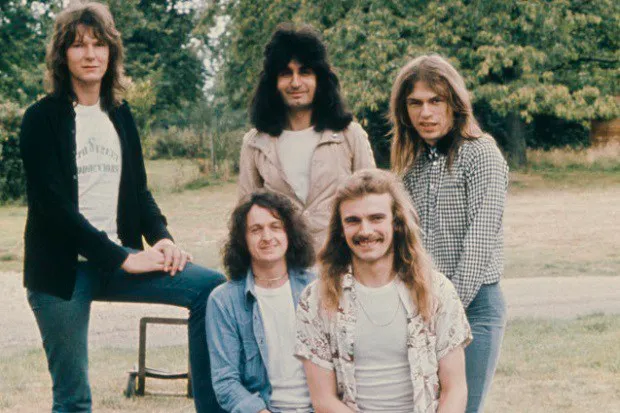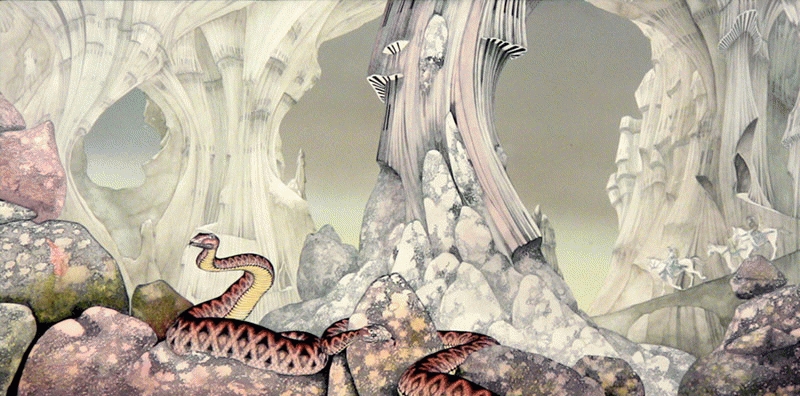Yes Forged Ahead with "Relayer"
The beginning of the end of their classic run?
Amongst contemporaries like King Crimson and Genesis, Yes had more than enough going for it to stand out from the crowd. The combination of Jon Anderson’s angelic falsetto and abstract lyrics, Chris Squire’s lead-like bass runs, Steve Howe’s experimental guitar explorations, Rick Wakeman’s classically-inspired keyboard flourishes, and Bill Bruford’s percussive jazz fills encompassed the trappings of progressive rock at its most potent.
Yes spent first half of the 1970s crafting The Yes Album, Fragile, and Close to the Edge—albums that would become a progressive rock bible; the latter arguably their most excellent release. Just as Yes started to take off commercially and drummer Alan White joined the fold, there was dissension in the ranks. Keyboardist Rick Wakeman’s distaste for Tales from Topographic Oceans, a double album with four 20+ minute epics that unintentionally parodied the genre’s excessive nature, led to his exit from the group.

It was business as usual when Swiss-born Patrick Moraz, fresh off the heels of working with bands like Mainhorse and Refugee, entered Yes’ roundabout of personnel. After pushing boundaries to a greater extent with Topographic Oceans, Relayer, released in 1974, recycles the winning formula of Close to the Edge: a side-long epic and two shorter (as in 10 minutes) tracks. “The Gates of Delirium” is a 20+ minute tour-de-force that draws lyrical inspiration from Tolstoy’s War and Peace and musically encompasses moods that resemble the horrors and hope that intertwine with the concept of war. Despite the song being one of the group's most dynamic epics, its closing section, released as a single called “Soon,” is one of Yes’ musical high points. Side 2 opens with “Sound Chaser,” a track that best represents Moraz’s jazz influence and is the closest Yes got to dabbling in jazz-rock. “To Be Over” is a beautiful album closer that encapsulates the group’s exquisite abilities with rich harmonies and sweet melodies.
Though loved by many diehard fans, Relayer is one of the few staples of the Yes’ canon that hasn’t seen much love regarding recent vinyl pressings. All that’s come in the last 15 years was the 2009 Friday Music reissue and Steven Wilson’s brilliant stereo remix of the album on the aptly titled Steven Wilson Remixes box set in 2018. Just in time for the album’s 50th anniversary this year, Warner Music decided to revive the album as part of the highly regarded Rhino High Fidelity series.

Artist Roger Dean's fantasy landscapes have become synonymous with Yes albums. His rendering of a gothic-looking fortified city with horseback soldiers (referencing “The Gates of Delirium”) and snakes looks striking on a glossy Stoughton tip-on jacket. All specifications of the original artwork, down to the gatefold design and lyric insert are replicated faithfully. Adding the element of exclusivity with this Rhino High Fidelity pressing is the OBI strip and four-panel insert featuring tape box scans and an in-depth essay by Syd Schwartz, with recollections from Patrick Moraz. Rhino's consistent center label appearing on all releases in the series is classy, but Dean’s custom center label reprising his gatefold jacket artwork for this release is an obvious omission.
Yes’ choice to record Relayer at bassist Chris Squire’s home studio in Surrey rather than in one of London’s conventional studios results in a lively recording. Squire's percussive bass tone and Alan White’s heavy-hitting drum work provide plenty of flavor. The syncopation during the introduction of “The Gates of Delirium” is bold and dramatic, signaling a battle cry. Supported by Jon Anderson’s demanding vocal delivery, the song builds with brewing intensity and modulated instrumental motifs before settling into the song's midsection where the band takes a back seat, and in the forefront scrap metal percussion plays out the battle.
As the “Soon” section eases in, Steve Howe’s pedal steel guitar and Moraz’s mellotron swell to give the song a symphonic, ethereal finish. White’s drum fills are panned tastefully between the speakers on “Sound Chaser.” The jazzed-out synthesizer runs and the in-your-face vocal chants contribute significantly to the song’s frantic nature. The electric sitar on “To Be Over” flows lucidly like the streams referenced in the lyrics. The vocals and pedal steel guitar cascades are firm reminders of for what people know and love Yes. Kevin Gray masters every nuance of this record to emphasize its contrasting and sometimes sudden mood changes, making this pressing sound delightfully dynamic from every possible angle.










































.png)








